<< Previous | Displaying results 1-10 of 128 for "Nazi Book Burning" | Next >>
Book burnings and bans were not exclusive to—and did not end with—the Nazi regime. Learn more about the symbolism of book burnings.
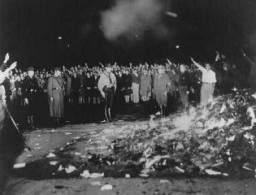
The Nazi book burnings of 1933 sparked responses from anti-Fascist organizations, Jewish groups, and writers in the United States. Learn more.
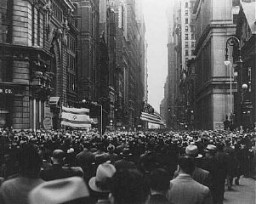
In front of the German consulate building, writers demonstrate against Nazi book burnings. New York, United States, May 10, 1938.
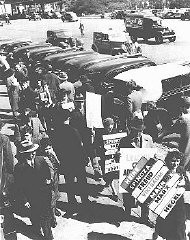
Book burning is the ritual destruction by fire of books or other written materials. The Nazi burning of books in May 1933 is perhaps the most famous in history. Learn more.
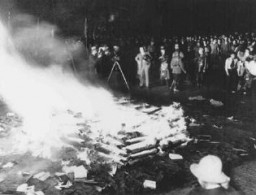
The film "The Nazi Plan" was shown as evidence at the International Military Tribunal in Nuremberg on December 11, 1945. It was compiled for the trial by Budd Schulberg and other US military personnel, under the supervision of Navy Commander James Donovan. The compilers used only German source material, including official newsreels. This footage is titled "The Burning of the Books, 10 May 1933."
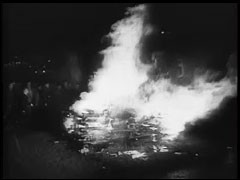
May 10, 1933. On this date, books deemed "un-German" are publicly burned throughout Germany.
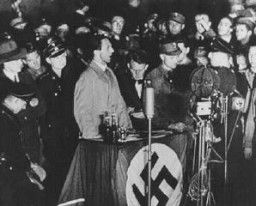
Across Germany, students took books by truck, furniture van, even oxcart, and heaped them into pyres on public squares. This image shows members of the SA and students from the University of Frankfurt with oxen pulling manure carts loaded with books deemed "un-German." Frankfurt am Main, Germany, May 10, 1933.
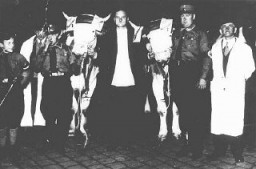
Browse a series of articles about the 1933 book burnings in Nazi Germany, including information about the works burned and the symbolism of the book burnings.
Books and writings deemed "un-German" are burned at the Opernplatz (Opera Square). Berlin, Germany, May 10, 1933.

On May 10, 1933, Nazi students at universities across Germany pillaged and burned books they claimed were “un-German.” The targeted books were those they deemed contrary to Nazi goals and beliefs. The book burnings are an example of the regime's eff...
We would like to thank Crown Family Philanthropies, Abe and Ida Cooper Foundation, the Claims Conference, EVZ, and BMF for supporting the ongoing work to create content and resources for the Holocaust Encyclopedia. View the list of donor acknowledgement.